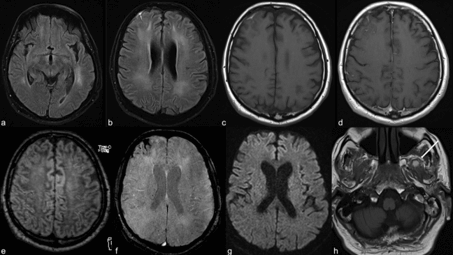
Neuroimaging for COVID-19
By: Karen Holzberger, President & CEO of SpinTech MRI
Comprehensive, Standardized Neuroradiology Monitoring of COVID-19 Patients
Approximately ⅓ of COVID-19 patients have reported experiencing a range of neurological symptoms including headaches, altered mental states, acute cerebrovascular disease, wide-spread inflammation and edema, and epilepsy. MRI is an important tool in analyzing the extent of any brain damage caused by the virus.
STAGE is designed to provide fast, 5-minute full brain coverage imaging and is collected at a resolution high enough to detect Cerebral Microbleeds and properly reconstruct neurovascular architecture.
Neurological Damage from COVID-19
By combining the information from the susceptibility-based contrast outputs of STAGE (SWI, tSWI, SWIM [QSM], R2*map) both very small and very large neurovascular lesions of different make-ups can be visualized while being differentiated from mimics like mineralization (calcium). STAGE can help mitigate the uncertainties surrounding imaging of COVID-19 recovered patients by adequately visualizing a wide range of lesions of various types and compositions.
What do we look for?
- Cerebral Microbleeds
- Vascular Malformations/Damage
- Thrombus/Embolus
- Subarachnoid Hemorrhage
- Water Content Changes/Inflammation
- Stroke/Venuous Oxygenation States
- Hemorragic Transformation (Acute vs. Chronic)
- Tissue Type Differentiation (White Matter, Gray Matter, and Cerebrospinal Fluid)
- Local Changes in Tissue Iron Composition
The Benefits of Monitoring With STAGE
STAGE offers the potential to provide excellent characterization and detection of COVID-19 related changes in the brain tissue of recovered patients. STAGE’s efficient acquisition means lesion detection isn’t lost to reducing resolution or increasing slice thickness to save time, and STAGE’s automated reconstruction of multi-parametric outputs means that the limitations of relying on one parametric image set are reduced.
Standardized & Comprehensive Imaging Protocol
- Reduce the need for patient re-scan with better comprehensive images
- Receive complete picture of brain characteristics faster than other software
- Standardized scans ensure consistent and comparable results
Reduce Image Acquisition Time
- Efficient data point acquisition reduces patient time in magnet while increasing image information depth
- Counterbalance increased environment sanitation time with shorter MRI scan time
Research-Grade Outputs for Clinical Interpretation
- Automated post-processing provides improved contrast, quantitative maps and composite images
- Images are available on the PACS shortly after each MR study is completed and uploaded
Automated Detection of Brain Damage Biomarkers
- Assess deep gray matter iron level changes typically associated with neurodegenerative diseases
- Longitudinally monitor hemorrhagic lesions and CMB (hemosiderin deposits) for changes
- Receive ideal depth of information for AI and data mining by including quantitative


